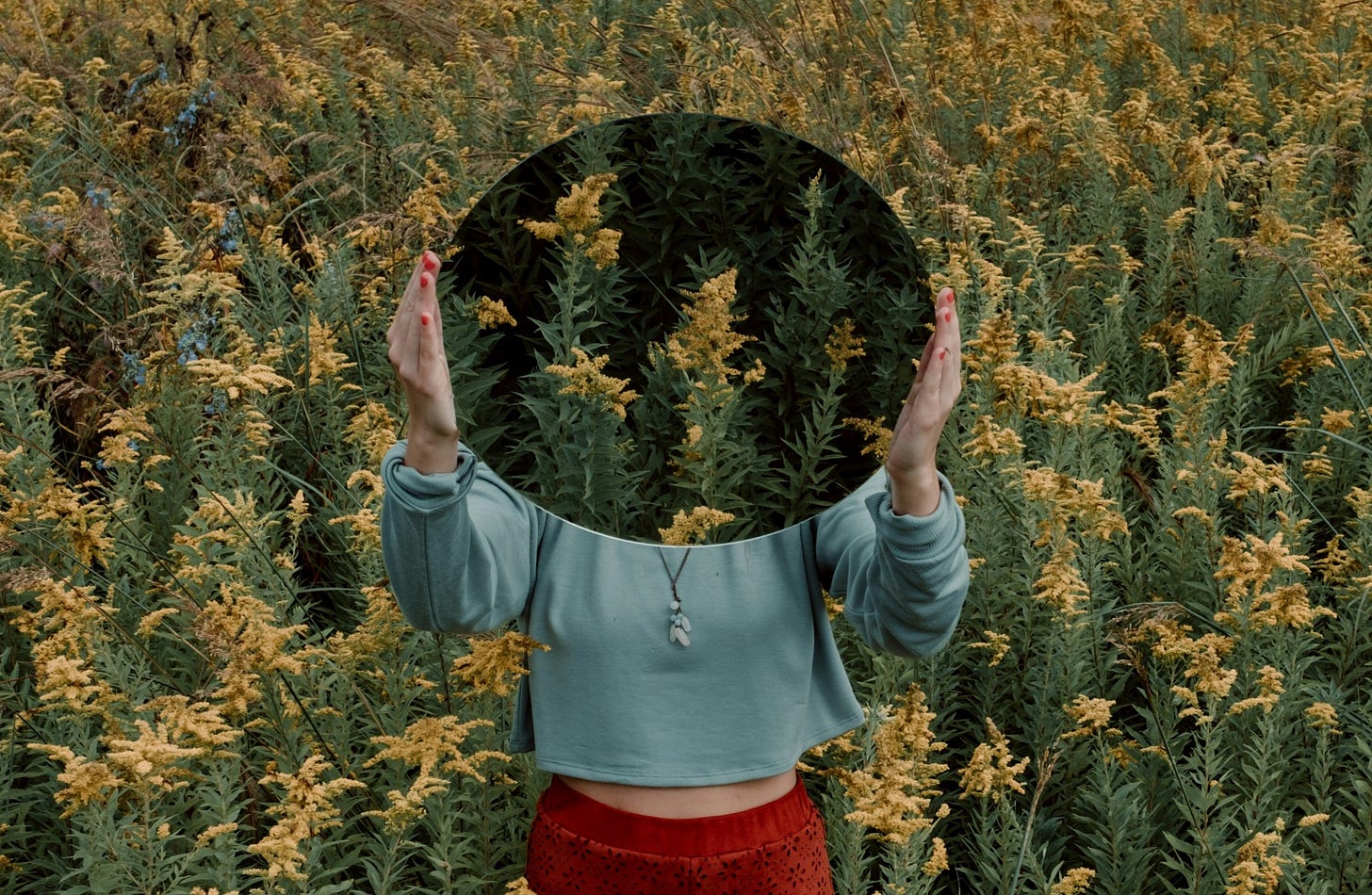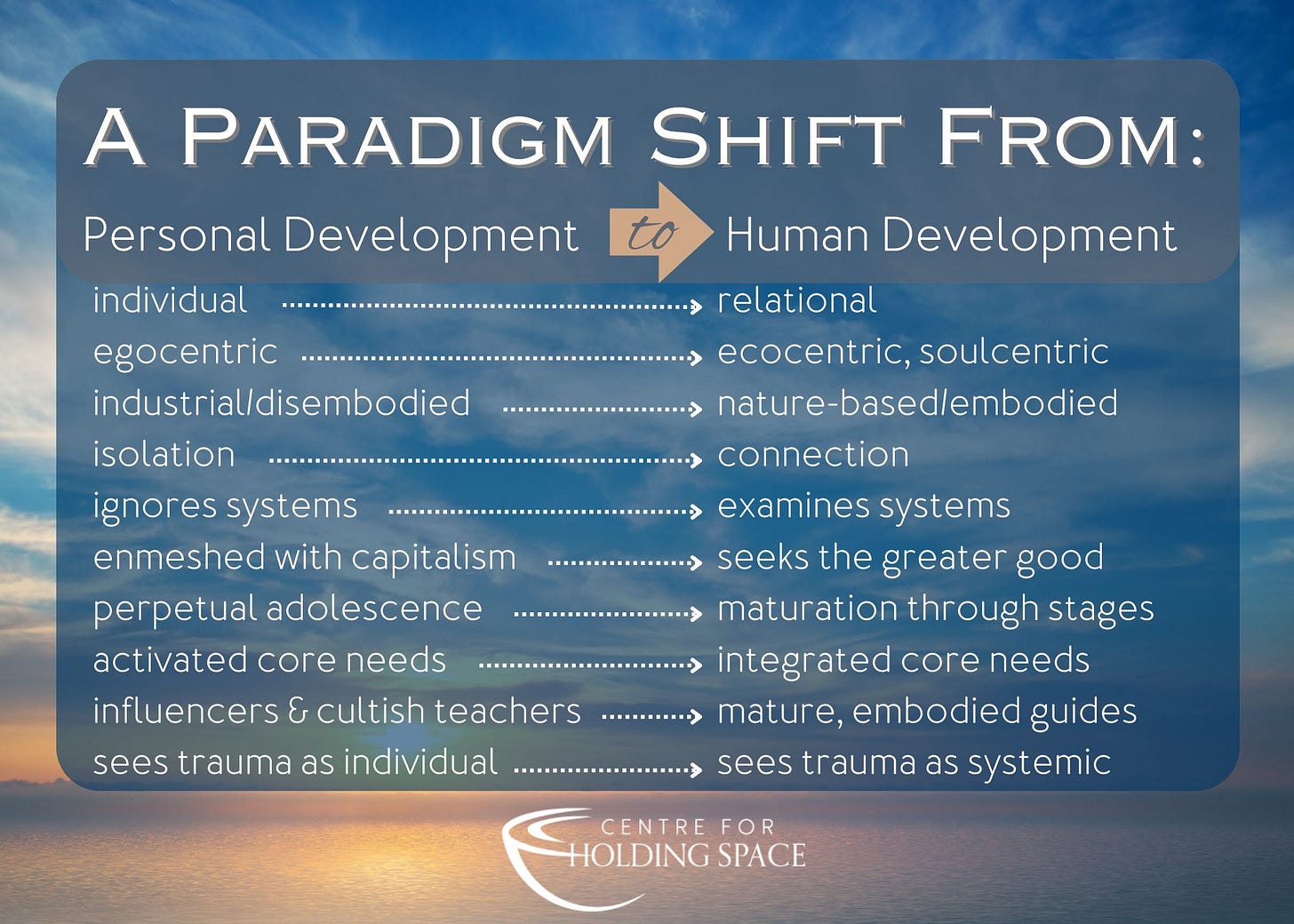Why I don't want to talk about personal development anymore
A change in language and a paradigm shift
It all started with a hashtag. Well, it actually started long before that, but it was a hashtag that poured fuel onto the smouldering embers.
Last year at this time, with the pressure of financial obligations bearing down on us, Krista and I turned to a marketing company, hoping they’d help us turn around the worrisome decline in program registrations. They pushed us on things that tend to make us both a little cringy, like SEO optimization, social media algorithms, and hashtags.
One of the hashtags they insisted we should be using consistently was #personaldevelopment. They made a good case for why hashtags help increase viewership of our posts, so we tried to comply. Look back through our posts from that time, and you’ll see our efforts to follow their advice.
But something didn’t sit right with me (and it wasn’t just my resistance to all things marketing). Even though I’ve been creating courses for several years that tend to fit under the banner of “personal development”, the term has always felt somewhat out-of-alignment with what’s at the heart of our work at the Centre for Holding Space.
I feel similarly about terms like self-help, self-care, self-improvement... almost all the “self hyphenates”. I’ve written about some of this discomfort before, but I’ve talked myself out of that discomfort several times, dismissing it as my tendency to overthink things.
It was only when I started immersing myself in Joanna Macy’s and Bill Plotkin’s work (as I mentioned in my last post) that the penny finally dropped (especially Plotkin’s book, Nature and the Human Soul).
Personal development, like self-help, and (according to Plotkin, who is a psychologist) much of modern psychotherapy, keeps us stuck in ego-centric adolescence and that is, ultimately, doing us more harm than good.
Personal development is rooted in a me-focused paradigm. It treats us largely as individuals, set apart from the collective and from the natural world. It’s the product of an immature, egocentric culture, one shaped by the Industrial Growth Society that I spoke of last week. It’s largely lead by charismatic influencers and cultish teachers, most of whom are stuck in psycho-spiritual immaturity themselves (and some who cause real harm).
Don’t get me wrong – there are many things associated with personal development that I believe in and will still talk about, like trauma healing, or even the theme of my second book – tenderness. I think we each need to do our own personal work to contribute more meaningfully to our collective humanity and so I will continue to emphasize the importance of holding space for yourself (it’s the most critical aspect of our How to Hold Space Foundation Program).
But we, at the Centre for Holding Space, have decided to intentionally change our language from “personal development” to “human development”.
Human development is about evolving ourselves as a collective, not as isolated individuals. It’s relational, recognizing the roles we all play in community, in our eco-systems, and in collective care. It’s a movement away from independence to interdependence, a movement from seeing ourselves as separate from nature to seeing ourselves AS nature. It’s about recognizing the contributions we each make to the systems we’ve built, seeing the harm those systems can cause, and then dismantling, rebuilding, and co-creating as necessary.
When I turn to the trees for wisdom, I see the ways in which they model this paradigm shift. There was once a time when we (at least those of us trained in western education systems) saw trees largely as unique entities, independent of each other. But now we know that trees in a forest are connected by an elaborate mycelial network under the soil. Trees talk to each other. They protect each other. They pass nutrients to trees with less access, even to other species. In order to thrive, trees need mycelium, just as they need moss and birds and squirrels. They are all part of the ecosystem that is a forest. (Read books like Finding the Mother Tree, The Hidden Life of Trees, or Entangled Life if you want to know more.)
“We don’t need more trees - we need more forests,” I once heard an environmentalist say of our response to climate change. “The idea of planting individual trees isolates them from the microbes in the soil, the birds, the animals and the other plants that are necessary,” says ecologist Thomas Crowther. He goes on to say, “Make sure you get the right mix of species and the right social context and you can actually have a positive impact.”
A personal development lens is one that sees us – humans - as trees without the social context of the forest. A human development lens sees the ecosystem of the whole forest.
In many ways, personal development is not “development” at all – at least not the kind of development that contributes to the well-being of the ecosystem. In Bill Plotkin’s words, it contributes to “arrested personal growth” which serves industrial growth. “By suppressing the nature dimension of human development (through educational systems, social values, advertising, nature-eclipsing vocations and pastimes, city and suburb design, denatured medical and psychological practices, and other means), industrial growth society engenders an immature citizenry unable to imagine a life beyond consumerism and soul-suppressing jobs.”
When I think of the potential that this shift from personal development to human development evokes, it makes me feel hopeful. I feel hopeful that we can shake off this individualistic industrial mindset that is keeping us stuck in adolescence. I feel hopeful that we can stop being cogs in the machine and that we can reawaken our wild nature. I feel hopeful that a more mature humanity will be a more reflective, more creative, less reactive, and more conscientious humanity – a humanity committed to being part of more healthy ecosystems.
“There's so much more to who you are than you know right now. You are, indeed, something mysterious and someone magnificent. You hold within you — secreted for safekeeping in your heart — a great gift for this world. Although you might sometimes feel like a cog in a huge machine, that you don't really matter in the great scheme of things, the truth is that you are fully eligible for a meaningful life, a mystical life, a life of the greatest fulfillment and service.” – Bill Plotkin
In the book Active Hope, Joanna Macy shares a commitment statement that she invites people to make at the end of an intensive ten-day workshop, which feels fitting for this paradigm shift to human development:
I vow to myself and to each of you:
To commit myself daily to the healing of our world and to the welfare of all beings.
To live on Earth more lightly and less violently in the food, products, and energy I consume.
To draw strength and guidance from the living Earth, the ancestors, the future generations, and my siblings of all species.
To support others in their work for the world and to ask for help when I need it.
And to pursue a daily practice that clarifies my mind, strengthens my heart, and supports me in observing these vows.
P.S. We, at the Centre for Holding Space, are committed to human development for the common good. To join us in dreaming of a more evolved humanity and healthier ecosystems, a good place to start is our How to Hold Space Foundation Program.





Thank you! As humans, we are communal beings, so it makes sense to do communal work. We must get there ourselves, but that is only part of it. I will relate it back to choir (again): When we sing in groups, our bodies shift frequencies and sync with those around us, and we move forward together.
Heather, it’s so interesting to watch your beautiful evolution on this. I have been practicing WTR principles and guiding programs for over five years. I remember discovering your work several years ago. It resonated with me partially, but I felt a disconnect. It was far too me-centered for me. I celebrate your process of connecting the dots and seeing our interdependence and interconnectedness. ❤️